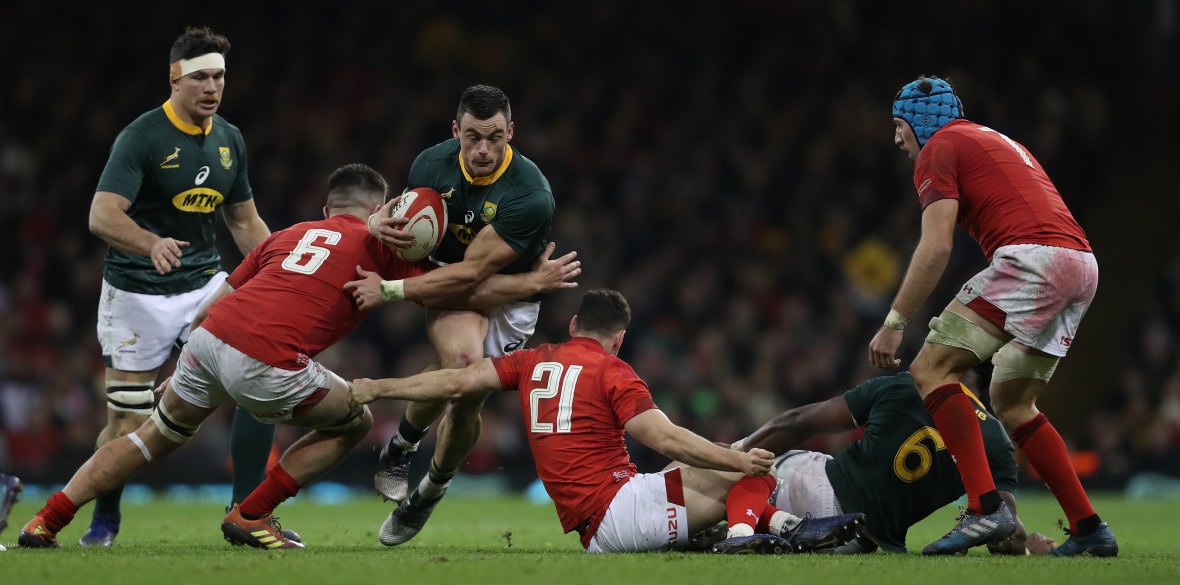This is the last article you can read this month
You can read more article this month
You can read more articles this month
Sorry your limit is up for this month
Reset on:
Please help support the Morning Star by subscribing here
THE PYROTECHNICS have been packed away until February and the southern hemisphere giants have gone home to lick their wounds after a bruising round of autumn internationals.
But now that the dust has settled, what have we learnt about the four home nations and their Six Nations and 2019 World Cup chances?
With Ireland second, Wales third and England fourth in the world rankings, the signs are positive that the 2015 RWC debacle, where all of the semi-final berths were filled by the southern hemisphere, is unlikely to be repeated next year.
Ireland are riding the crest of a wave and swept the recent World Rugby awards. They won the team of the year title, while Jonathan Sexton was player of the year and Joe Schmidt coach of the year.
Schmidt and the Irish RFU have transformed their domestic game subordinating it to the needs of the international side.
That properly managed approach has led Ireland to a Six Nations Grand Slam followed by a clean sweep of their autumn fixtures, including toppling the mighty All Blacks.
Schmidt’s side physically dominated New Zealand for most of the game with an intense physical performance.
With Jacob Stockdale’s match-winning try against the All Blacks and a side that still has first-choice players still to return, the outlook is rosy.
However, Schmidt’s side have to negotiate some difficult away fixtures in the Six Nations against Wales and Scotland.
And the men in green also have a tricky opening game in Dublin against England.
But if Ireland can achieve a second Grand Slam, it would certainly install them as Would Cup favourites.
As for Wales, head coach Warren Gatland has quietly gone about his business of developing strength in depth in his squad and adapting the way the side plays.
The much-derided Warren-ball tactic of big men trying to crash through defences failed to defeat the top teams.
Now Wales have risen to third in the World Rugby rankings and have achieved a clean sweep of the autumn internationals for the first time.
Gatland’s side also removed the psychological barrier of beating Australia.
A narrow three-point win against the Wallabies followed a poor game by both sides, with all 15 points coming from the boot.
But victory against the Wallabies has been beyond Wales until now and the stodgy fare has been forgotten in the afterglow of victory.
Gatland’s squad has been burnished with riches in the forwards, especially the back row with Justin Tipuric and the sensational Ellis Jenkins.
A comprehensive 20-11 victory against the Springboks put the icing on the cake for Wales, but the celebrations were muted by the terrible knee injury to flanker and man of the match Jenkins.
But Wales’s Six Nations prospects will be strengthened by the expected return of Josh Navidi and Taulupe Faletau.
Such strength in depth has seen Gatland steer Wales to third place in the world rankings and his World Cup swansong before he leaves as head coach could see his greatest triumph yet.
England have slid down the rankings to fourth place after their poor Six Nations performance and defeat on their summer tour to South Africa.
But coach Eddie Jones seems to have staunched the loss of confidence and found a better-balanced forward pack.
Some of England’s difficulties were in open play, where they lacked a proper No 7 to compete for loose balls.
With Tim Curry and Sam Underhill competing for the spot, Jones’s side now has a true No 7.
England comprehensively beat Australia and narrowly beat the Springboks.
But the English display against the All Blacks hinted at a World Cup campaign to erase the memory of the 2015 debacle.
England allowed the All Blacks back into the game with some sloppy line-out work, but almost won the game in the dying seconds with a narrowly off-side interception leading to a ruled-out try for Underhill.
Jones will still be concerned by the lack of game management shown by his side against Japan in particular, but also their failure to take the three points on offer against the All Blacks.
That poor decision to kick for a line-out which England then lost cost the home team a rare victory against the world champions.
The other area of concern for England is the no-arm tackling of co-captain Owen Farrell.
He got away with two tackles against South Africa and Australia which could have seen him yellow-carded.
The furore caused by Farrell’s tackling will have been noted by top referees and it is unlikely he will be treated so leniently again.
If England fail to rectify this problem, it could cost the team at a crucial point in a decisive game.
Scotland are seventh in the world and on their day can beat any team.
Coach Gregor Townsend’s men lost at home to South Africa and away to Wales, but beat Fiji and Argentina.
The attack-minded Scots are deadly when their game gels, as it did most memorably against England in February.
But Townsend’s side do not seem able to repeat their home form when they travel, so were well beaten by Wales in the autumn opener in Cardiff.
Part of Townsend’s problem is the lack of depth he enjoys among the forwards, which costs the side as replacements are poured on in the second half of games.












